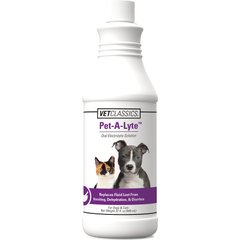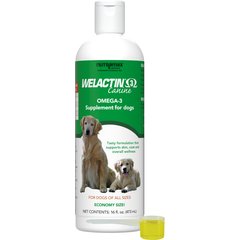Hereditary, Non-Inflammatory Muscular Disease in Dogs
Non-inflammatory Myopathy—Hereditary X-Linked Muscular Dystrophy in Dogs
Muscular Dystrophy is an inherited, progressive, and non-inflammatory degenerative muscular disease caused by a deficiency of dystrophyin, a muscle-membrane protein. This generalized muscle disorder is primarily seen in newborn dogs or those less than one year old. Male dogs are also more susceptible than females, as are golden retrievers, Irish terriers, Pembroke Welsh corgis, Samoyeds, rottweilers, Belgian shepherds, rat terriers, Brittany spaniels, Labrador retriever, German short-haired pointers, and miniature schnauzers -- all of which often suffer from dystrophin deficiency.
Symptoms and Types
- Vomiting
- Excessive drooling (ptyalism)
- Exercise intolerance
- Abnormal gait
- Muscle wasting
- Increased muscle mass of some muscles (e.g., tongue)
- Aspiration pneumonia (caused by choking on vomit material)
- Hunched back
- Sway back
- Ineffective suckling in newborns
- Heart failure
Vet Recommended Health Support
- Purina Pro Plan Veterinary Diets FortiFlora Powder Probiotic Digestive Supplement for Dogs, 30 count$30.99Chewy Price
- VetClassics Pet-A-Lyte Oral Electrolyte Solution Dog & Cat Supplement, 32-oz bottle$17.99Chewy Price
- Nutramax Welactin Omega-3 Liquid Skin & Coat Supplement for Dogs, 16-fl oz$27.99Chewy Price
- Fera Pets USDA Organic Pumpkin Plus Fiber Support for Dogs & Cats, 90 servings$34.95Chewy Price
Causes
Dystrophin deficiency due to inherited defect.
Diagnosis
You will need to give a thorough history of your dog’s health, including the onset and nature of the symptoms, to your veterinarian. He or she will then conduct a complete physical examination as well as a biochemistry profile, urinalysis, and complete blood count (CBC). Creatine kinase enzyme levels may be elevated due to the dystrophin deficiency. Liver enzymes are also elevated in dogs with this disorder.
The most hopeful test for reaching a definitive diagnosis, however, involves taking a muscle biopsy. The muscle tissue sample is sent to a veterinary pathologist to verify abnormal levels of dystrophin.
Treatment
No treatment is proven to be effective. Glucocorticosteriods are often given to dogs suffering from non-inflammatory muscular dystrophy, but their effectiveness is variable and their exact mode of action in this disease is still unknown.
Living and Management
Dogs with this disorder are prone to aspiration pneumonia or cardiac disease and must evaluated at regular intervals for such complications. Be vigilant of complications and contact your veterinarian should problems arise. However, symptoms may stabilize after six months in Golden retrievers.
Unfortunately, the overall prognosis is very poor in dogs with non-inflammatory muscular dystrophy. Often, your veterinarian will discourage breeding the animal, due to the genetic nature of the disorder.



